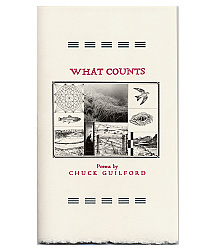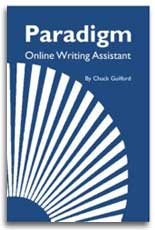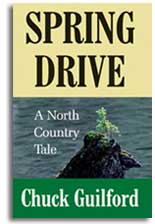Start Writing
There is no single best way to begin a writing project. What's best is what gets you going and builds momentum for the journey ahead. You may want to start right in on a draft or do some pre-planning.
Often, simply Choosing a Subject can be a challenge. You could start Freewriting to locate your subject and generate ideas. Or you might prefer to first gather information from Outside Sources, or to brainstorm using The Journalists' Questions.
Whether you're writing an informal essay, a technical report, or the next great American novel, the suggestions in Discovering What to Write will help you get going.
Write Strong Sentences
Effective sentences are vital to your writing. They are fundamental carriers and shapers of meaning—the pulse of style. If you want to work on your sentences, try the following Paradigm sections: Basic Sentence Concepts, Expanding the Basic Pattern, Six Problem Areas, Designing Effective Sentences.
For help with punctuation, try Basic Punctuation.
In Search of Form
Everything has a form. In writing, the goal is to find a form that suits your material and purpose. You may sense a clear pattern emerging early in your writing process, or you may try out a few promising designs.
Read more ...A Note on Spelling
There's no quick, easy way to overcome spelling problems. This is true partly because our English spelling system is complex and difficult to explain logically.
Read more ...Global and Local Perspectives
Revision means "re-seeing." Strong revisers develop a "critical zoom lens" that allows them to shift perspective from broad overview to minute detail, and to see how these levels of composition relate. To revise well, then, you must become a perceptive and imaginative reader of your own work, a reader who can anticipate another reader's response and see new ways the writing might evolve.
Read more ...Occasions for Informal Essays
A thoughtful letter to an old friend, a reflection on your education or ethnic heritage, a childhood reminiscence—these could all be informal essays. In writing, informality depends less on subject or structure than on the writing context. Informal essays assume a personal stance. They suggest close connections among writer, reader, and subject.
Read more ...Outside Sources
Unlike the other discovery techniques, which mostly call on your internal powers of observation and imagination, this one emphasizes investigation and research. However vast your store of information and however well you can express your ideas, you'll often need to extend your knowledge by drawing on the experience and expertise of others.
Read more ...Arguing in Context
Like other types of writing, arguments respond to specific situations: a need is not being met, a person is being treated unfairly, an important concept is misunderstood, an outdated policy needs to be reexamined. Strong arguments respond effectively to such writing contexts.
Read more ...Introductions and Conclusions
The beginning and end of your essay are positions of high emphasis. They deserve careful attention. Keep them short and purposeful. Use them to create and satisfy expectations. Get into the habit of reading your introduction and conclusion together, with an eye toward revision, as one of the last stages in your writing process.
Read more ...


